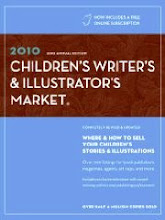Exclusive SCBWI TEAM BLOG Pre-Conference Interview: Tina Wexler...
 Tina Wexler is a literary agent at International Creative Management (ICM), a full-service agency and home to Dr. Seuss and E.B. White. Her list includes fiction and nonfiction for children and adults, with a focus on middle grade and YA.
Tina Wexler is a literary agent at International Creative Management (ICM), a full-service agency and home to Dr. Seuss and E.B. White. Her list includes fiction and nonfiction for children and adults, with a focus on middle grade and YA.
Recent and forthcoming titles represented by Tina include Donna Gephart's As If Being 12 3/4 Isn't Bad Enough, My Mother Is Running For President (winner of SCBWI's 2009 Sid Fleischman Humor Award), Sara Lewis Holmes' Operation Yes (Arthur A. Levine Books), Mara Purnhagen's Tagged (Harlequin Teen), Laurel Snyder's Baxter, The Pig Who Wanted To Be Kosher (Tricycle), and Sanjay Patel's Ramayana (Chronicle).
Please tell us about how you got into agenting and how you ended up at ICM.
After getting my MFA in poetry, I applied for a job as an agent assistant to Louise Quayle and Elizabeth Kaplan at the Ellen Levine Literary Agency. There, I cut my teeth on permissions, audio and serial sales, and foreign rights. Around the time ELLA merged with Trident, I moved to the Karpfinger Agency to continue with foreign rights but soon left to start building my own list at ICM.
What are the advantages for you working at a big agency? What are the advantages for your authors?
The advantage of being at a big agency is that everything is kept in-house , which means having more control of what is happening with my clients' projects (and for the client, only one commission). We have the Los Angeles office shopping our books for film/TV; we have the London office securing UK and translations deals; we have an in-house lecture department; an agent who sells audio, ebook, and serial rights; and a theater department ready to negotiate stage adaptations of our books. I'm able to pull from a number of resources: our in-house attorneys, our tax and royalty departments, the knowledge and experience of the ten other agents working in our literary department. All of these elements come together to make my office run smoothly so I can focus entirely on my clients and their needs.
Do writers of books for young readers really need to have agents?
I think the benefits of having the right agent--whether you write for the adult market or the children's market--are immeasurable. Certainly, there are books that get published without the involvement of an agent, but that's not the route I would go were I a writer. Having an agent is a real asset, and in most circumstances, an absolute requirement just to enter the ring. (Don't ask why a boxing metaphor is cropping into my answer. We can debate whether writers need to have agents, but there's no doubt everyone could use an editor!)
If a writer is unsure whether she needs an agent, she will want to assess how comfortable she feels mixing business dealings with the creative process. How contract-savvy she is, how great she is at negotiating. How many doors are open to her at the various publishing houses. How capable she is of selling subrights such as audio, film/TV, and UK/translation rights to her book on her own. And for agents like me who can be very hands-on when it comes to getting a manuscript into the best possible shape before submission, how strong is her revision process. If she feels that she'd like a partner to help her in any or all of these areas (and there are so many other things that agents do each day for their clients), she needs an agent.
What type of material do you represent? Are you open to queries?
I represent mostly YA and MG (and adult non-fiction too). Within those categories, I'm interested in most everything: magical realism/paranormal, mysteries, adventure, suspense, contemporary, and some non-fiction for teens. I tend to shy away from high fantasy and poetry collections, but I love novels-in-verse. In short: make me laugh, make me angry, make me cry, make me pause. Also, I do not represent screenplays. I am accepting queries at twexler[at]icmtalent[dot]com, despite what ICM's website says about unsolicited material.
Would you offer some general advice on approaching agents?
First, do your research. I know it's tempting to query every agent you find info on--the old "throw it at the wall and see what sticks" approach--but doing so only results in slower response times and fewer agents responding to queries at all, which no one wants. So do yourself and your fellow writers (and agents) a favor and be selective. Second, be professional but know that I'm in this business because I love the written word, I love stories, and I really do want to hear from you if our interests overlap.
What will you be talking about at the SCBWI Winter Conference?
I'll be doing an agent panel ["Ask the Agent: 3 Agents Analyze the Market"] with George Nicholson [Sterling Lord Literistic] and Rosemary Stimola [Stimola Literary Studio], talking about the market and addressing any other questions thrown our way.
Why do you recommend writers attend conferences? Have you found clients at such events?
Conferences are a great way to connect with other writers, to meet editors and agents, and to get a sense of what is happening in the business all while being inspired creatively by the workshops and speakers. I am working with several writers whom I met through conferences, and a majority of my clients are SCBWI members.

 Visit Lee Wind's Blog for the latest in our series of exclusive SCBWI TEAM BLOG pre-conference interviews with SCBWI Winter Conference speakers and keynoters.
Visit Lee Wind's Blog for the latest in our series of exclusive SCBWI TEAM BLOG pre-conference interviews with SCBWI Winter Conference speakers and keynoters.














